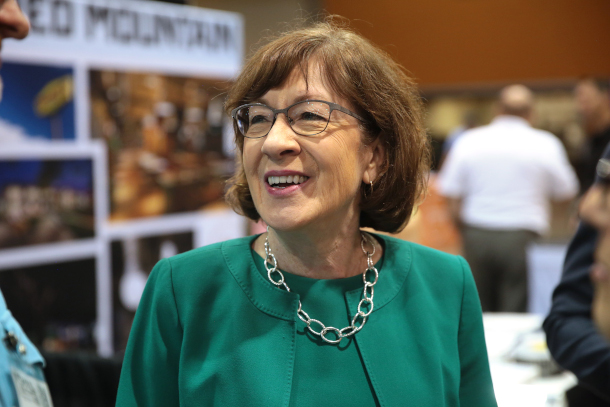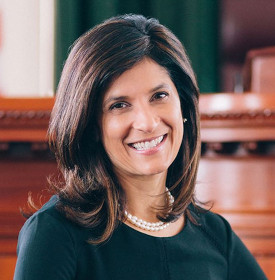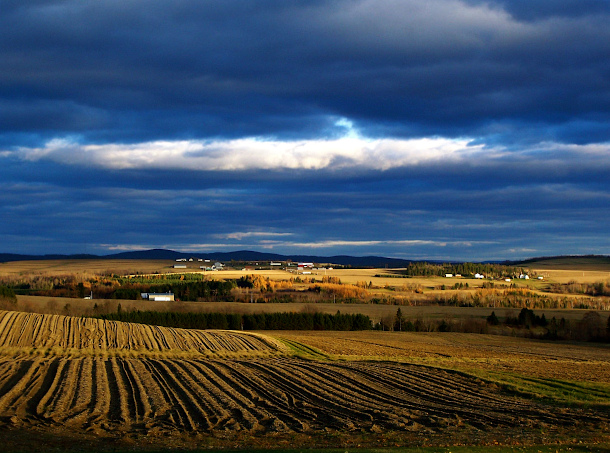Maine Senate Race and the Environment
Air Date: Week of October 2, 2020

Republican Susan Collins has a lifetime score of 61% according to the League of Conservation Voters, but they have switched their support to Democratic challenger Sara Gideon after endorsing Sen. Collins in 2014. (Photo: Gage Skidmore, Flickr, CC BY-SA 2.0)
One of the key races in the 2020 elections is for the US senate in Maine, where the environment is consistently rated as a priority issue for voters. Incumbent Senator Susan Collins is known for having a strong environmental record among her Republican colleagues, but many environmental groups focused on the campaign for a more environmentally-friendly Democratic majority in the Senate have switched their support to Democratic challenger Sara Gideon. Host Steve Curwood is joined by Bangor Daily News Politics Editor Michael Shepherd to discuss this contest.
Transcript
CURWOOD: From PRX and the Jennifer and Ted Stanley Studios at the University of Massachusetts Boston, this is Living on Earth. I’m Steve Curwood.
With control of the US Senate hanging in the balance Maine moderate Republican Senator Susan Collins is facing a tough election to keep her seat for a fifth term. She is being challenged by Sara Gideon, the current Democratic Speaker of the house in the Maine legislature. Maine is heavily dependent on a healthy environment for tourism, fisheries, farming, and forestry. For more on how climate change and the environment is influencing the Senate race in Maine I’m joined now by Michael Shepherd, Politics Editor of the Bangor Daily News.
SHEPHERD: Thanks, Steve.
CURWOOD: So Michael, for years, Susan Collins has had a strong environmental record as a Republican. There's been years that the League of Conservation Voters gave her 100 points. More recently, not so high. Why has there been a shift of climate and environmental groups away from Susan Collins in this election cycle? Do you think?
SHEPHERD: Really, I think it's national politics. Steve, we've seen over the years, Susan Collins was an early supporter of, you know, climate science. She was, in 2003 she voted for the Senate's really the first bill to try to reduce emissions. She's been sort of out in front of this issue for a long time. What's happening now, though, I think is these environmental groups are seeing a Democratic candidate in Sara Gideon, who really has a shot at unseating Senator Collins, they just haven't had that in the past. So I think what they're seeing is these judicial nominations that have been really controversial, and they see Sara Gideon is someone who's very reliable on that issue for them. So I think these environmental groups that have backed Collins in the past did that sort of out of a practical nature. Now they have someone they can they can maybe trust a little bit more, regardless of the policy differences, which are slimmer between these two candidates, then you're typically used to seeing between Democrats and Republicans.

Polls suggest Democratic Sara Gideon has a shot to unseat the four-term Republican Senator from Maine in one of the toughest tests Susan Collins has faced for reelection (Photo: Pebbleroad, Wikimedia Commons, CC BY SA-4.0)
CURWOOD: And now to what extent is the national interest because the Senate is in balance here?
SHEPHERD: Yeah.
CURWOOD: If Susan Collins were to lose, it would put democrats one seat closer to gaining the majority in the Senate.
SHEPHERD: Yeah, it's an amazing race here. We've been fighting this number for a long time, and it's a little higher now. But we've seen $40 million in outside money. And the candidates themselves raised that much by June alone and with much more money coming into the race, this is easily going to go over 100 million dollars, it's going to be the most expensive race in Maine history. So this is clearly on the national radar. It's one of the key seats that Democrats really need to flip the Senate. And it's a place where Republicans have you know, maybe a candidate who can weather the storm a little better than some other incumbents, but she's still underwater here a little bit in a democratic leaning state and you know, that crossover popularity is largely gone.
CURWOOD: So Michael, just lay out in broad strokes for me, how do Susan Collins and her challenger, Sara Gideon, stack up from an environmental perspective?
SHEPHERD: Susan Collins has supported lots of individual policies around climate that most environmental groups would believe in, she's tried to incentivize clean energy development. You know, she's been there on emissions reductions and things like that. Sarah Gideon has outlined kind of a consensus democratic platform on climate, it involves larger goals like getting to zero emissions by 2050, across the country. So she's relatively safe on the issue. She hasn't stuck her neck out to support the green New Deal. She's sort of praised it for the energy that it's giving to, you know, sort of the climate movement, but she's not ready to go there. I think Susan Collins is more likely to offer sort of more piecemeal concrete steps Sara Gideon is looking to sort of drive the conversation going forward.
CURWOOD: So Mike, talk to me about some of the key environmental issues that Mainers vote on. I know you've done some polling, I think on Mainer attitudes towards the climate crisis. How do those breakdown?

Aroostook County, Maine’s agricultural hub, is facing one of the worst droughts in the past 130 years this summer, and some, including Democratic US Senate candidate Sara Gideon, have linked the drought to global climate change. (Photo: Richard Robles, Flickr, CC BY-NC-ND 2.0)
SHEPHERD: Yeah, it's pretty interesting. Maine is concerned about climate change, for the most part, and we see it in our lobster industry. There's a concern that, you know, lobsters are moving North, there's a concern about erosion in some of our seaside towns, there's a lot of worry about the issue generally. We polled Mainers in August, and we found that about 77% of people were either somewhat or very concerned about it. It actually breaks down in ways that are a little surprising. You see that when you say how much is Maine impacted by climate change? There are about Jeez, it's almost universal among Democrats and Republicans, about 40% of Republicans say that Maine has either been impacted somewhat or a great deal by climate change. So it's something that it certainly breaks down along partisan lines, but it's not something that is as partisan as you may think. And I think that's sort of a testament to the universal appreciation for the environment that we have here in Maine.
CURWOOD: Tease apart for me for a moment the differences between Sarah Gideon and Susan Collins when it comes to their voting records on environmental issues. Yeah, I would say that Sara Gideon has championed pro-solar bills in the legislature. She has supported these these sort of long term goals that Governor Mills has gotten behind and are sort of driving the state level climate change conversation. You look at Susan Collins' record and if you're an environmentalist, there are may be things that you're concerned about and things that you may support. For instance, she voted for the 2017 tax bill after trying to get a provision out that opened ANWR the Alaskan wildlife refuge to oil and gas drilling. She tried to get it out on an earlier vote and then ended up voting for the version that left it in. So that was that something controversial that people are pointing to but she's also supported a lot of one-off measures that would have addressed climate change in more targeted ways.
Maine also faces climate threats in the form of sea level rise and eroding shorelines. (Photo: Isaac Merson)
CURWOOD: So one of the things that's really interesting about this race, Mike is that on the one hand, you have Susan Collins as a Republican back in 2010, offering a plan with Maria Cantwell, the democrat from Washington state for what was known as a cap and dividend way to address carbon that virtually all the money collected in the form of a fee on carbon use would get rebated to consumers. And then in Maine, in the house, you have Sarah Gideon proposing essentially a carbon tax. So both of these folks have really stuck their necks out at times to say, let's put a price on carbon. Why and how should that matter to voters? Do you think?
SHEPHERD: I think it shows it shows the differences between them to a certain degree, the carbon tax was something that Governor Janet Mills, who's you know, who's a Democrat, and she's environmentally focused, that's something she was she didn't want to put on the table here. So it was very quickly killed in the Maine legislature and was just a partisan bill and really didn't have much of a prayer from the beginning. The Collins example you cited is pretty interesting in that it also didn't go anywhere. But it was a pretty interesting design, where 75% of the revenue collected would have gone to consumers in a direct rebate from these carbon credit sales that producers would pay. And the rest of it would go to clean energy development. So I've actually talked to experts who said the Collins proposal is probably more progressive and effective, but they're not running on these plans right now. And Collins is campaigning against Gideon on the carbon tax even though these two proposals would have done at the end of the day, similar things they would have priced carbon in different ways, certainly, but similar designs. So these are things that they're both running away from them to a certain degree, Susan Collins isn't saying whether she'd support that design that she supported back then and Sarah Gideon's saying, "Well, I don't support any carbon tax on the federal level." So it's not something they're racing toward in this election, but it's going to be something up here, it's a cold state, people are still heavily reliant on heating oil. It's something that Republicans have used against past candidates with varying degrees of success, of course, but you know, it's gonna be something people are watching up here for sure how that would fall in consumers.
CURWOOD: The National situation with the competition between former Vice President Biden and present President, Mr. Trump seems to be the big focus here. How did these two candidates, how do voters resonate with them on the national ticket situation.
Climate change is an issue Mainers care about, even if it doesn’t directly drive their vote. The Gulf of Maine is one of the fastest warming bodies of water on the planet, which has serious implications for the lobster fishery and tourism industry. (Photo: Isaac Merson)
SHEPHERD: Climate itself is not the biggest issue in this race for the voters. It certainly is for, you know, perhaps Democratic voters who have ranked this about as high as health care in some of the surveys that we've done of our readers, but it's sort of baked into all these really controversial elements that made this a campaign. 10 years ago, when I started doing this, you know, I wouldn't have thought Senator Collins would be in a reelection fight here in 2020. But here she is, this is the person who has, you know, polled at 70% approval ratings in the past. She's, She's been very popular for a long time. So what has turned this into a race is was the Kavanaugh vote in 2018. And now we have another Supreme Court nomination fight on our hands. And that's another, that's a whole different issue. But I think you see the climate issue sort of being wrapped in to that larger judicial nomination issue. And that's really, that's really what the momentum in this race has sort of, has sort of revolved around.
CURWOOD: Michael Sheppard is the politics editor of the bank or Daily News, Bangor, Maine. Thanks so much for taking the time with us today.
SHEPHERD: Thank you, Steve.
Links
Bangor Daily News | “How Maine’s US Senate Candidates Differ on Climate Change and the Environment”
Bangor Daily News | “Maine Voters' Level of Concern About Climate Change Breaks Down by Party Lines”
Bangor Daily News | “Sara Gideon ‘Climate Agenda’ Endorses Making US Carbon Neutral by 2050”
Read what Susan Collins has to say about environmental issues
Living on Earth wants to hear from you!
Living on Earth
62 Calef Highway, Suite 212
Lee, NH 03861
Telephone: 617-287-4121
E-mail: comments@loe.org
Newsletter [Click here]
Donate to Living on Earth!
Living on Earth is an independent media program and relies entirely on contributions from listeners and institutions supporting public service. Please donate now to preserve an independent environmental voice.
NewsletterLiving on Earth offers a weekly delivery of the show's rundown to your mailbox. Sign up for our newsletter today!
 Sailors For The Sea: Be the change you want to sea.
Sailors For The Sea: Be the change you want to sea.
 The Grantham Foundation for the Protection of the Environment: Committed to protecting and improving the health of the global environment.
The Grantham Foundation for the Protection of the Environment: Committed to protecting and improving the health of the global environment.
 Contribute to Living on Earth and receive, as our gift to you, an archival print of one of Mark Seth Lender's extraordinary wildlife photographs. Follow the link to see Mark's current collection of photographs.
Contribute to Living on Earth and receive, as our gift to you, an archival print of one of Mark Seth Lender's extraordinary wildlife photographs. Follow the link to see Mark's current collection of photographs.
 Buy a signed copy of Mark Seth Lender's book Smeagull the Seagull & support Living on Earth
Buy a signed copy of Mark Seth Lender's book Smeagull the Seagull & support Living on Earth

